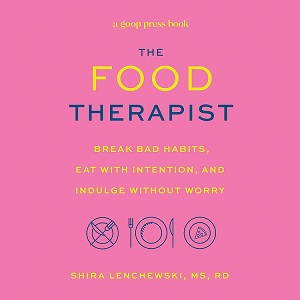The Food Therapist: Break Bad Habits, Eat with Intention, and Indulge Without Worry by Shira Lenchewski is a practical guide that addresses the psychological and emotional factors that influence our eating habits. Lenchewski, a registered dietitian, provides actionable steps to help readers develop a healthier relationship with food. The book is divided into lessons that guide readers toward understanding their food patterns and making better choices. Below is a breakdown of the key lessons from the book:

Read: Drop the Ball
1. Identify Your Food Triggers
The first step in creating a healthier relationship with food is identifying your food triggers. Lenchewski emphasizes the importance of understanding what drives your eating habits—whether it’s stress, boredom, or emotional distress. By recognizing these triggers, you can begin to address the underlying issues and develop strategies to manage them without turning to food.
2. Practice Mindful Eating
Mindful eating is a central theme in Lenchewski’s approach. She encourages readers to pay attention to their food choices, savor each bite, and listen to their body’s hunger and fullness cues. This practice helps prevent overeating and promotes a more satisfying and conscious eating experience.
3. Break the Cycle of Restrictive Dieting
Lenchewski argues against the traditional dieting mentality, which often leads to cycles of restriction and binge eating. Instead, she advocates for a more balanced approach to eating, where no foods are off-limits, and moderation is key. This helps to eliminate the guilt and anxiety associated with food and promotes a healthier, more sustainable relationship with eating.
4. Set Realistic Goals
Setting realistic and achievable goals is crucial for long-term success in any lifestyle change, including improving your eating habits. Lenchewski advises readers to start with small, manageable changes that can be gradually built upon. This approach prevents overwhelm and increases the likelihood of maintaining these habits over time.
5. Cultivate a Positive Food Mindset
A positive mindset toward food is essential for making healthy choices without feeling deprived. Lenchewski encourages readers to shift their perspective from viewing food as the enemy to seeing it as a source of nourishment and pleasure. This change in mindset allows for a more enjoyable and guilt-free relationship with food.
6. Understand the Science of Cravings
Understanding the science behind cravings is another important lesson in the book. Lenchewski explains how cravings are often linked to nutritional deficiencies, emotional needs, or even habits. By understanding why you crave certain foods, you can find healthier alternatives or address the root cause of the craving.
7. Develop Healthy Coping Mechanisms
Many people turn to food as a way to cope with stress, anxiety, or other negative emotions. Lenchewski teaches readers how to develop healthy coping mechanisms that don’t involve food, such as exercise, meditation, or journaling. These alternative strategies help to reduce emotional eating and improve overall well-being.
8. Reframe Your Relationship with Food
Lenchewski encourages readers to reframe their relationship with food by shifting the focus from restriction to nourishment. This involves recognizing food as a source of energy and joy, rather than something to be controlled or feared. By adopting this mindset, you can enjoy food without guilt and make choices that align with your health goals.
9. Build a Support System
Building a support system is essential for maintaining healthy eating habits. Lenchewski suggests surrounding yourself with people who encourage and support your goals. Whether it’s friends, family, or a community group, having a support system can provide accountability and motivation.
10. Make Peace with Food
Making peace with food is about letting go of the negative emotions associated with eating, such as guilt, shame, or anxiety. Lenchewski emphasizes the importance of forgiving yourself for past mistakes and focusing on making better choices moving forward. This lesson is about finding balance and enjoying food as part of a healthy lifestyle.
11. Prioritize Nutrient-Dense Foods
While Lenchewski advocates for a balanced approach to eating, she also emphasizes the importance of prioritizing nutrient-dense foods. These are foods that are rich in vitamins, minerals, and other essential nutrients that support overall health. By filling your plate with nutrient-dense options, you can improve your energy levels, mood, and well-being.
12. Listen to Your Body
Listening to your body’s signals is a critical aspect of mindful eating. Lenchewski encourages readers to pay attention to their hunger and fullness cues, rather than eating out of habit or emotion. This practice helps you eat in a way that truly satisfies your body’s needs, rather than overindulging or restricting yourself unnecessarily.
13. Plan and Prepare Meals with Intention
Meal planning and preparation are key to maintaining healthy eating habits. Lenchewski advises readers to approach meal planning with intention, focusing on creating balanced and satisfying meals that support your health goals. Planning ahead can reduce the temptation to make unhealthy choices and ensure that you always have nutritious options available.
14. Embrace Flexibility
Flexibility is important in developing a sustainable relationship with food. Lenchewski suggests that it’s okay to deviate from your usual eating patterns occasionally, as long as it doesn’t become a regular habit. Embracing flexibility allows you to enjoy life without feeling restricted, while still maintaining your overall health goals.
15. Celebrate Progress, Not Perfection
Finally, Lenchewski encourages readers to celebrate their progress rather than striving for perfection. Every small step toward healthier eating habits is an achievement worth recognizing. By focusing on progress, you can build momentum and maintain motivation on your journey to a healthier relationship with food.
Conclusion
The Food Therapist by Shira Lenchewski offers a holistic approach to improving your relationship with food. By following these fifteen principles, you can break free from unhealthy habits, embrace a more balanced and mindful approach to eating, and ultimately achieve a healthier, happier life.


